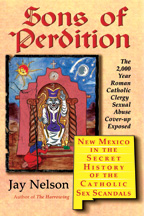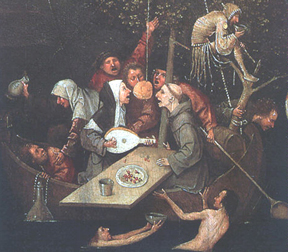Though I wandered away from the Roman Catholic Church decades ago, for many years I still considered myself “catholic.” Today I may be still obsessed, but mainly about concerns largely cultural and historical. In my living daily spiritual practice and faith, I am still trying to transcend it, though that “indelible mark” still itches. My own story of abuse and recovery in that regard is briefly recounted here.

Craving the comforts of religion as well as intellectual freedom, in 1991 I was ordained as a priest in what was then called the Church of Antioch – Malabar Rite. This was an Independent Catholic denomination. These churches maintain apostolic succession and the traditional sacraments but are not in communion with Rome. There are many such small “mom and pop” churches around, but they all differ widely in doctrine and practices. Most clerics in these denominations want to be Catholic priests, but cannot for some reason.
The Church of Antioch was one of the most liberal and mystical of these. Gender, sexual preference, or marital status did not matter in determining who could serve as priests. Long before the current divisiveness afflicted so many denominations, there were women and gays, married, divorced, and unmarried clergy, all peacefully working together. In fact, for many years, the Church of Antioch was headed by a female archbishop, Matriarch Meri Spruit of blessed memory. It was generously non-dogmatic in other ways as well: all sincere seekers, visitors as well as baptized members in good standing, were freely admitted to the Lord’s table.
I was lucky enough to be mentored and eventually ordained by the bishop of Santa Fe, the Most Rev. Richard A. Gundrey, who later became Patriarch of the Church of Antioch after ‡Meri. However, my clerical career quickly foundered and nearly sank completely soon after I discovered I had been abused. Bishop Gundrey was most supportive however, even holding a public seminar on abuse. The Church also passed a set of principles decades before Rome did.
Nonetheless, my first attempt to start a parish failed miserably. When I joined with a fellow priest, a former prison chaplain named Fr. Dennis Bryan, to try again years later, he quickly succumbed to cancer. I did have the honor of ministering to +Dennis through his passing, though, a blessing that I still cherish.
Since then I pray physically alone in the humble chapel I made out of an old brick chicken-coop in the backyard and with that I must be largely content. Safe and comfortable as it feels, I still find it incredibly hard to open up spiritually in any church, even my own.
I became a priest, I think, to have the same power as my perp. Ordination made me feel equal, but it had a great cost, for it made me the Catholic Church’s enemy long before I realized they considered me one.
As an Independent Catholic priest not willing to surrender to their authority, the Roman Church regarded me an enemy of the faith. By my claiming the priesthood, I am not only their competition, but a schismatic heretic with whom they must have no dealings. Yet despite this, I had never officially sundered my ties to the church I was baptized in as a baby.
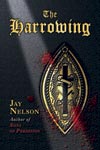
Not even the recovery of horrific memories of sexual and ritualistic abuse at the hands of a priest which became the inspiration for my first self-published novel, The Harrowing, could make me take that final leap. It took a far deeper appreciation of the suppressed history of the Roman Church to prompt such a definitive step.
What made me decide to make it formal was the discovery of a translation of canonical instructions, Crimen Sollicitationes — “Crimes of Solicitation”. This document began the long journey for me until I eventually requested and received a formal, written, signed and sealed excommunication from the Roman Catholic Church.
Crimen Sollicitationes was quietly approved on March 16, 1962, by the so-called “good pope”, John XXIII, revered for bringing together the Second Vatican Council which for better or worse has opened the Church to the world. Issued by the Supreme and Holy Congregation of the Holy Office — now called the Dicastery for the Doctrine of the Faith, but far better known as the Holy Inquisition — it contains secret procedures to be used in the cases of priests accused of soliciting sex while hearing private confessions.
Discovered among a tranche of legal documents released during the first round of the Boston scandals, it was undoubtedly deliberately leaked. It was the first evidence that the lack of scandals in the Catholic Church was due to the Inquisition. The document, however, extended the authority and power to bishops around the world to hold secret trials on their own. Even so, the bishops claim that most have never heard of it.
One would reasonably expect the Inquisition to come down hard on abuse. However, the Inquisition was never concerned with priestly morality. Messing with the sacraments, however, is another story for heresy is where their interest remains to this day. But despite this – and fifty years of continuing crisis – neither pedophilia nor bestiality merit excommunication. Indeed, not a single priestly predator has ever been excommunicated for their heinous offenses which Christ himself condemned. If any have been so, it has been done secretly because of misuse of the sacraments, not of people. No matter how notorious their sexual crimes may have been, they have been laicized under pressure but still only at their own request.
Yet laicization only removes the legal right, not the power or ability, to perform the sacraments. Removing the priestly power, like the “indelible mark on the soul” made by baptism, cannot be done according to Catholic doctrine. “Thou art a priest forever, according to the order of Melchizedek,” the ordination ritual proclaims, and the clerics take it seriously.
None of the true monsters, James Porter, David Holley, or even John Geoghan were ever booted out. Indeed, as revealed in a prison interview, Geoghan, who raped possibly 150 children, believed himself to still be a priest and a faithful Roman Catholic until he was murdered in prison.
Secrets upon secrets
Since all was to be kept secret under papal seal, victims who speak out later give scandal to the Church, and should be thus automatically excommunicated as well. No wonder we have been treated so poorly.
Victims are treated as enemies by the Catholic Church because that is how the hierarchy sees us. The danger all abuse victims pose to the Church is simply because we are all proof of their failure.
It will take more than half-hearted organizational reforms by the pope to change this: the entire clerical culture must be changed, which has generated tremendous resistance. Moreover, the bishops were required to keep the policy secret as well under the pain of excommunication as well. So they have lied, lied, and continue to lie, under the direct orders of the Vatican.
The apologists were right about one thing – Crimen Sollicitationes is not an extraordinary document. It is merely a restatement of how things have been done for centuries. The Catholic Church has held itself to be above secular law from the beginning. At best, the state existed to serve the Church, never the other way around.
“Benefit of clergy,” after all, did not mean a condemned person got to see a priest before execution. In the Middle Ages, it actually meant that if an accused person could prove he was a cleric, usually by reading the parish’s Latin Bible, he would not be tried in a secular court, but turned over to the local bishop, who had the Church’s own prisons, the “monasteries of strict observance” in which to incarcerate him for life.
The greatest punishment that the Church can ever inflict was excommunication. For millennia, the mere threat of it effectively intimidated kings and emperors as well as simple folk, for it was a sentence of death, often physical as well as spiritual. In the Age of Faith, excommunication not only cut one off from the sole source of sanctity without which there is no salvation, it barred one from all Christian society. Excommunicated persons had no rights; they could hold no office; no allegiance or even assistance was due them. In short, excommunicants were regarded as enemies of the state and outlaws.
In modern times, with members of different denominations living cheek by jowl, reality had to be accommodated. So along with excommunicants who were not allowed in a church, there were also the “tolerati“, those whose presence was allowed by the Catholic Church. Types of excommunications were specified, too. The less serious kind can be done by the act of an ordinary (an abbot or bishop); in which case, that prelate (or a superior) would be the one to lift it. Or it can be much more serious, and reserved for the pope or his representative to deal with it.
My case
None of this mattered to me much as long as I was ignorant of my past. As for my abuse, Crimen Sollicitationes, signed the very week my ordeal began at the hands of the Rev. Thomas P. Wilkinson, would doubtless apply. There was solicitation (along with threats and false teaching) in the confessional from the very start.
To say I was utterly shocked and horrified by this document is an understatement. By my interpretation, since I lacked the courage to tell even my poor mother of the full extent of my torment, I thus failed to notify the bishop (in this case, the Most Rev. James P. Davis) and thus have not been a part of the Roman Catholic Church for most of my life.
Yet ironically, all these monsters remained Catholics. My perpetrator, who with another clerical accomplice had not hesitated to violate the secrets of the confessional in order to conceal his crimes, had probably been caught at some point and confessed. When he finally died (rumor said of hepatitis B), he was the revered pastor of the oldest parish in the city, and was accompanied by an honor guard of seven priests for his burial in his hometown, at least one of which was later disgraced.
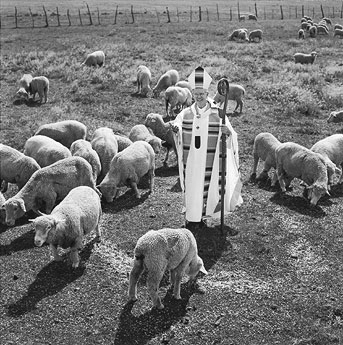
All of this was simply too much to be endured. Therefore, I wrote a letter to the then-current Roman Catholic Archbishop of Santa Fe, the Most Rev. Michael J. Sheehan, outlining the situation and politely asking for a formal excommunication. I even enumerated the offenses I had committed as an adult worthy of censure, and which canons I had trampled. (After all, for several decades before and even after my ordination, I played priest in a medieval recreation society, though I always carefully restrained my worst heretical tendencies.)
Not surprisingly except for the speed at which it was done, His Excellency most graciously granted my request. It is the only time the Archbishop of Santa Fe has ever voluntarily communicated with me as a victim or as a contumacious heretic. Here is the relevant portions of his reply:
Therefore, at your request, I excommunicate you ferendae sententiae from the Catholic Church. I hope this will give you the peace of soul that you request and I know that you are acting in sincere good faith that this is what Our Lord seems to want from you.
Letter from Abp. Michael Sheehan, dated August 18, 2003
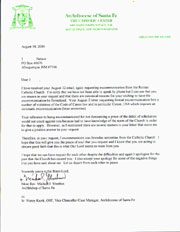
Thus, at last, I am out. I take considerable satisfaction that I am no longer any part of an institution claiming to be from God that punishes victims of its clergy for being abused by that clergy.
In my worst moments, the Roman Catholic Church has seemed no less than the Scarlet Woman, the very Whore of Babylon, a wicked mother steeped in two millennia of corruption deserving neither respect nor obedience. If Jesus came back tomorrow, I rather fancy that he would at the very least say, “Come out from her, o my people,” before consigning the rest to hell.
Yet in my more rational moments, I remember that the Roman Catholic Church is full of genuinely good people who sincerely love God, his Son, and his people. But these souls have long been surrounded by a web of self-serving con men, who hide behind the saints to practice evil.
But my quest did not end there, thanks be to God. For I was granted a completely unexpected miraculous healing — and, almost as amazingly, a financial settlement.
